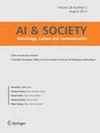全球治理和人工智能的正常化对人类健康“有益”
IF 2.9
Q2 COMPUTER SCIENCE, ARTIFICIAL INTELLIGENCE
引用次数: 1
摘要
“人工智能”一词在政治话语中的作用,正如拉克劳所说,是一个“空的能指”。本文追溯了全球治理的三个关键机构——人权高专办、世卫组织和联合国教科文组织——关于人工智能的政治话语的转变,并在此过程中强调了“危机”时刻在证明一系列关键重新表述的合理性方面的作用。最重要的是,人工智能与人类医疗保健中数字自动化的叙述相关联。在大流行的社会背景下,这三个机构都从批评人工智能经济中的不平等权力关系,转变为今天将自己主要重新定位为负责帮助确保人工智能技术应用的促进者。该分析确定了一种转变,即人类健康和医疗保健被视为一场“危机”,而人工智能技术被视为补救措施。这篇文章认为,有必要追踪这些话语的转变,以此作为一种理解、监控的手段,并在必要时也考虑到人工智能在社会治理中的这些变化。本文章由计算机程序翻译,如有差异,请以英文原文为准。
Global governance and the normalization of artificial intelligence as ‘good’ for human health
Abstract The term ‘artificial intelligence’ has arguably come to function in political discourse as, what Laclau called, an ‘empty signifier’. This article traces the shifting political discourse on AI within three key institutions of global governance–OHCHR, WHO, and UNESCO–and, in so doing, highlights the role of ‘crisis’ moments in justifying a series of pivotal re-articulations. Most important has been the attachment of AI to the narrative around digital automation in human healthcare. Greatly enabled by the societal context of the pandemic, all three institutions have moved from being critical of the unequal power relations in the economy of AI to, today, reframing themselves primarily as facilitators tasked with helping to ensure the application of AI technologies. The analysis identifies a shift in which human health and healthcare is framed as in a ‘crisis’ to which AI technology is presented as the remedy. The article argues the need to trace these discursive shifts as a means by which to understand, monitor, and where necessary also hold to account these changes in the governance of AI in society.
求助全文
通过发布文献求助,成功后即可免费获取论文全文。
去求助
来源期刊

AI & Society
COMPUTER SCIENCE, ARTIFICIAL INTELLIGENCE-
CiteScore
8.00
自引率
20.00%
发文量
257
期刊介绍:
AI & Society: Knowledge, Culture and Communication, is an International Journal publishing refereed scholarly articles, position papers, debates, short communications, and reviews of books and other publications. Established in 1987, the Journal focuses on societal issues including the design, use, management, and policy of information, communications and new media technologies, with a particular emphasis on cultural, social, cognitive, economic, ethical, and philosophical implications.
AI & Society has a broad scope and is strongly interdisciplinary. We welcome contributions and participation from researchers and practitioners in a variety of fields including information technologies, humanities, social sciences, arts and sciences. This includes broader societal and cultural impacts, for example on governance, security, sustainability, identity, inclusion, working life, corporate and community welfare, and well-being of people. Co-authored articles from diverse disciplines are encouraged.
AI & Society seeks to promote an understanding of the potential, transformative impacts and critical consequences of pervasive technology for societies. Technological innovations, including new sciences such as biotech, nanotech and neuroscience, offer a great potential for societies, but also pose existential risk. Rooted in the human-centred tradition of science and technology, the Journal acts as a catalyst, promoter and facilitator of engagement with diversity of voices and over-the-horizon issues of arts, science, technology and society.
AI & Society expects that, in keeping with the ethos of the journal, submissions should provide a substantial and explicit argument on the societal dimension of research, particularly the benefits, impacts and implications for society. This may include factors such as trust, biases, privacy, reliability, responsibility, and competence of AI systems. Such arguments should be validated by critical comment on current research in this area. Curmudgeon Corner will retain its opinionated ethos.
The journal is in three parts: a) full length scholarly articles; b) strategic ideas, critical reviews and reflections; c) Student Forum is for emerging researchers and new voices to communicate their ongoing research to the wider academic community, mentored by the Journal Advisory Board; Book Reviews and News; Curmudgeon Corner for the opinionated.
Papers in the Original Section may include original papers, which are underpinned by theoretical, methodological, conceptual or philosophical foundations. The Open Forum Section may include strategic ideas, critical reviews and potential implications for society of current research. Network Research Section papers make substantial contributions to theoretical and methodological foundations within societal domains. These will be multi-authored papers that include a summary of the contribution of each author to the paper. Original, Open Forum and Network papers are peer reviewed. The Student Forum Section may include theoretical, methodological, and application orientations of ongoing research including case studies, as well as, contextual action research experiences. Papers in this section are normally single-authored and are also formally reviewed. Curmudgeon Corner is a short opinionated column on trends in technology, arts, science and society, commenting emphatically on issues of concern to the research community and wider society. Normal word length: Original and Network Articles 10k, Open Forum 8k, Student Forum 6k, Curmudgeon 1k. The exception to the co-author limit of Original and Open Forum (4), Network (10), Student (3) and Curmudgeon (2) articles will be considered for their special contributions.
Please do not send your submissions by email but use the "Submit manuscript" button.
NOTE TO AUTHORS: The Journal expects its authors to include, in their submissions:
a) An acknowledgement of the pre-accept/pre-publication versions of their manuscripts on non-commercial and academic sites.
b) Images: obtain permissions from the copyright holder/original sources.
c) Formal permission from their ethics committees when conducting studies with people.
 求助内容:
求助内容: 应助结果提醒方式:
应助结果提醒方式:


